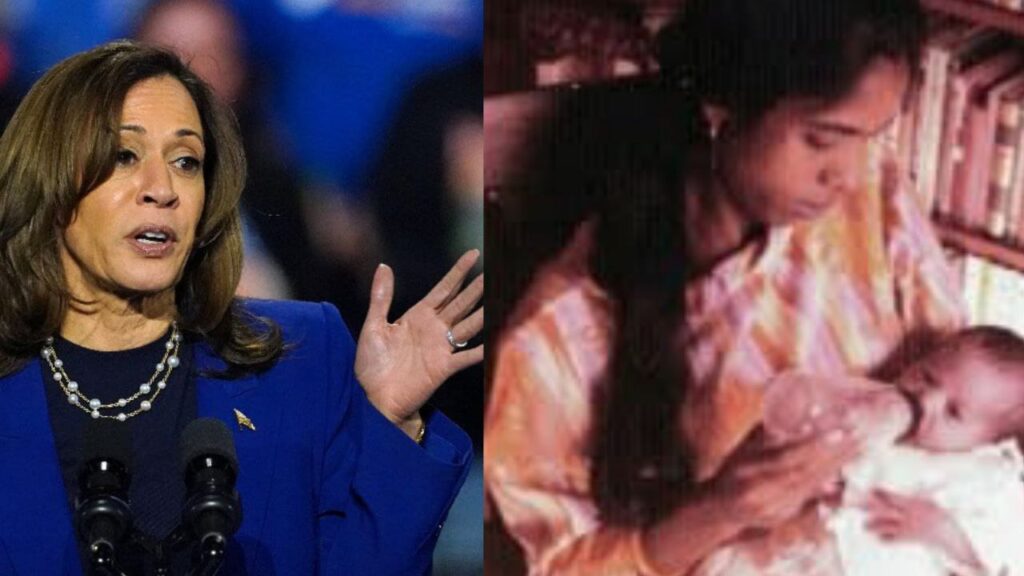
In each important speech she makes, Democratic presidential candidate Kamala Harris speaks about one woman first and foremost: her late mother, a trailblazing scientist who came to the United States from India.
The anecdotes serve not just to explain her life story — they help the vice president, who has not made her identity a central theme of the White House race, to talk about feminism and racism.
“My mother was a brilliant, five-foot-tall, brown woman with an accent. And as the eldest child, I saw how the world would sometimes treat her,” Harris said in August at the Democratic National Convention.
In the speech, her first as the party’s official presidential nominee, Harris recounted at length the journey of Shyamala Gopalan, who left her homeland at the age of 19 to do a master’s degree in California.
Gopalan would go on to become a prominent breast cancer researcher, who contributed to the development of several treatments for the disease.
This week in Washington, as Harris spoke before tens of thousands of supporters in the center of the US capital, the person she mentioned the most — after her Republican rival Donald Trump — was her mother.
The vice president talks about her mother’s American experience as a woman of color — a concept she hardly ever discusses as it pertains to her own life.

Harris never mentions the fact that she will become the first woman US president if elected, as well as the first Black woman and person of South Asian descent in the Oval Office.
Debbie Walsh, the director of the Center for American Women and Politics at Rutgers University in New Jersey, says it is a deliberate choice by Harris not to mention these potentially historic milestones.
“She has to convince the people who need to be ‘reassured’ that a woman can do this job and be strong and tough,” Walsh told AFP.
But “there is racism, there is sexism,” the researcher notes. “That all exists out there, and she can’t act as though that doesn’t exist,” so talking about her mother is “a way for her to acknowledge it, but not have it focus as much on her.”

‘Long hours’
Gopalan met Jamaican immigrant Donald Harris in the early 1960s at the University of California, Berkeley, where he had come to study economics.
They found each other right in the heat of the civil rights movement, and Kamala Harris — born in 1964 — was brought to marches in a stroller.
After her parents divorced when she was five, Harris and her sister Maya were mainly raised by their mother.
“She taught us to never complain about injustice, but do something about it,” Harris has said.
The early, hectic days of her campaign, which only began in July once President Joe Biden stepped aside, were marked by an unexpected symbol, drawn from one of Gopalan’s favorite expressions — a coconut.
But Harris has since used stories from her childhood to make a more personal connection with voters, and emphasize how she intends to work for middle-class families that reflect her own upbringing.
Harris often talks about how her mother “worked long hours,” and then sat late at night drinking tea with “a pile of bills in front of her.” Gopalan kept a strict budget, Harris says, and focused on saving for a first home.
The vice president has also talked about caring for her sick mother, preparing meals and choosing clothes that would not irritate her skin. Gopalan died after a battle with colon cancer in 2009.
Single mothers
With women’s rights at the heart of the White House battle, Harris has put her mother — a woman who married for love in an “act of self-determination” rather than face an arranged marriage in India — front and center.
The vice president, who helped raise her husband’s two children from his previous marriage, speaks rarely about her father, who is in his 80s and lives in Washington.
Trump has called Donald Harris a “Marxist,” but the retired university professor has distanced himself from politics for a long time.
For Walsh, it’s neither surprising nor new for a presidential candidate to put their mother — and not father — in the limelight.
Bill Clinton and Barack Obama — who, like Harris, never highlighted that he would make history by becoming America’s first Black president — were both raised by single mothers, and spoke of them often while campaigning, Walsh said.
Those mothers “then become an outsized force in their lives, and in talking about who they are and how they grew up, they would really be center stage, right?” she said.
“I mean, it would be kind of odd to think they wouldn’t.”
(AFP)
